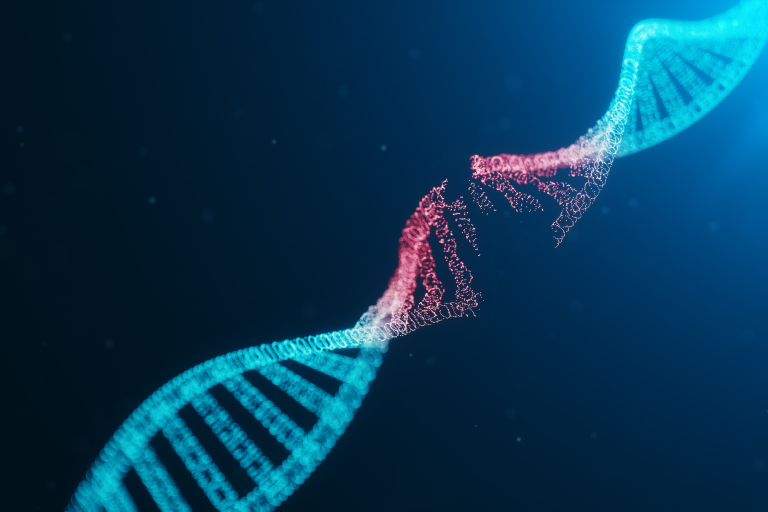Novel Mechanism in DNA Damage Unraveled
A research team from the University of California (UC), Irvine, has revealed a previously unknown mechanism that triggers an inflammatory immune response in cells when their DNA is damaged. The finding provides a new understanding of a new type of cell signaling that may lead to more effective treatments for cancer.
The study is published in Nature Structural & Molecular Biology in an article titled, “ATM and IRAK1 orchestrate two distinct mechanisms of NF-κB activation in response to DNA damage.”
The researchers discovered that UV irradiation or certain chemotherapeutic drugs activate a specific response when cells are too damaged to be repaired correctly, preventing them from becoming cancerous.
“DNA damage in cells induces the expression of inflammatory genes,” the researchers wrote. “However, the mechanism by which cells initiate an innate immune response in the presence of DNA lesions blocking transcription remains unknown. Here we find that genotoxic stresses lead to an acute activation of the transcription factor NF-κB through two distinct pathways, each triggered by different types of DNA lesions and coordinated by either ataxia-telangiectasia mutated (ATM) or IRAK1 kinases.”
“This discovery could have significant implications for cancer treatment,” explained corresponding author Rémi Buisson, PhD, UC Irvine associate professor of biological chemistry. “Understanding how different cancer cells react to DNA damage could lead to more tailored and effective therapies, potentially reducing negative side effects and improving the quality of life for patients.”
Scientists have long understood that when both DNA strands are broken, the ATM enzyme triggers the activation of the protein NF-κB within the cell, leading to the production of inflammatory signals. In this study, spearheaded by postdoctoral fellow Elodie Bournique, PhD, and assisted by graduate student Ambrocio Sanchez, it was shown that when DNA damage occurs due to UV exposure or treatment with chemotherapeutic drugs such as actinomycin D or camptothecin, the IRAK1 enzyme induces NF-κB to send out signals to recruit immune cells.
The researchers developed an imaging technique to analyze how NF-κB is regulated at the cellular level. They were able to measure a cell’s response to damaged DNA at the single-cell level and observed a new pathway to the activation of NF-κB. They found that after specific types of injury, cells release the IL-1α protein. It doesn’t act on the cell itself but travels to neighboring cells, where it triggers the IRAK1 protein, which then initiates the NF-κB inflammatory response.
“Our findings will help us better understand the consequences of certain types of chemotherapeutic drugs that are used to treat patients and cause DNA damage. We’ve discovered that the IL-1α and IRAK1 proteins, which play a role in the immune process, vary significantly across different cancer cell types. This suggests that not all patients will react to treatment in the same way, Buisson said. “By assessing these protein levels ahead of time, doctors might be able to personalize therapies tailored to individual patients’ needs for improved success rates.”
Looking toward the future, the researchers will continue their work by testing their findings on mouse models that lack specific factors involved in the new pathway.
DNA repair, oxidative stress, genomic instability, cell cycle checkpoints, DNA double-strand breaks, single-strand breaks, DNA methylation, nucleotide excision repair, base excision repair, homologous recombination, non-homologous end joining, telomere shortening, replication stress, chromosomal aberrations, mutagenesis, apoptosis, tumorigenesis, reactive oxygen species, genetic mutations, cancer progression
#DNArepair, #GenomicInstability, #CellCycle, #DNADamage, #OxidativeStress, #ChromosomalAberrations, #Mutagenesis, #Telomeres, #HomologousRecombination, #NonHomologousEndJoining, #BaseExcisionRepair, #NucleotideExcisionRepair, #ReactiveOxygenSpecies, #ReplicationStress, #Tumorigenesis, #DNARepairMechanisms, #CancerResearch, #GeneticMutations, #Apoptosis, #GenomeIntegrity
Award Nomination: genetics-conferences.healthcarek.com/award-nomination/?ecategory=Awards&rcategory=Awardee
Award registration: genetics-conferences.healthcarek.com/award-registration/
For Enquiries: genetics@healthcarek.com
Get Connected Here
---------------------------------
---------------------------------

Comments
Post a Comment